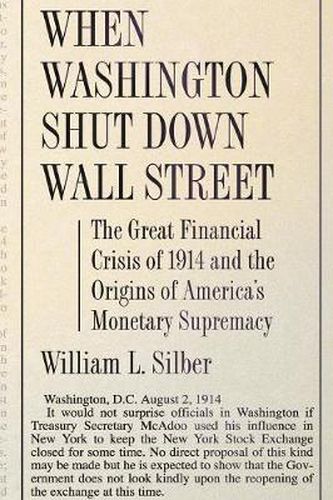Readings Newsletter
Become a Readings Member to make your shopping experience even easier.
Sign in or sign up for free!
You’re not far away from qualifying for FREE standard shipping within Australia
You’ve qualified for FREE standard shipping within Australia
The cart is loading…






When Washington Shut Down Wall Street unfolds like a mystery story. It traces Treasury Secretary William Gibbs McAdoo’s triumph over a monetary crisis at the outbreak of World War I that threatened the United States with financial disaster. The biggest gold outflow in a generation imperiled America’s ability to repay its debts abroad. Fear that the United States would abandon the gold standard sent the dollar plummeting on world markets. Without a central bank in the summer of 1914, the United States resembled a headless financial giant.William McAdoo stepped in with courageous action, we read in Silber’s gripping account. He shut the New York Stock Exchange for more than four months to prevent Europeans from selling their American securities and demanding gold in return. He smothered the country with emergency currency to prevent a replay of the bank runs that swept America in 1907. And he launched the United States as a world monetary power by honoring America’s commitment to the gold standard.His actions provide a blueprint for crisis control that merits attention today. McAdoo’s recipe emphasizes an exit strategy that allows policymakers to throttle a crisis while minimizing collateral damage. When Washington Shut Down Wall Street recreates the drama of America’s battle for financial credibility. McAdoo’s accomplishments place him alongside Paul Volcker and Alan Greenspan as great American financial leaders. McAdoo, in fact, nursed the Federal Reserve into existence as the 1914 crisis waned and served as the first chairman of the Federal Reserve Board.
$9.00 standard shipping within Australia
FREE standard shipping within Australia for orders over $100.00
Express & International shipping calculated at checkout
When Washington Shut Down Wall Street unfolds like a mystery story. It traces Treasury Secretary William Gibbs McAdoo’s triumph over a monetary crisis at the outbreak of World War I that threatened the United States with financial disaster. The biggest gold outflow in a generation imperiled America’s ability to repay its debts abroad. Fear that the United States would abandon the gold standard sent the dollar plummeting on world markets. Without a central bank in the summer of 1914, the United States resembled a headless financial giant.William McAdoo stepped in with courageous action, we read in Silber’s gripping account. He shut the New York Stock Exchange for more than four months to prevent Europeans from selling their American securities and demanding gold in return. He smothered the country with emergency currency to prevent a replay of the bank runs that swept America in 1907. And he launched the United States as a world monetary power by honoring America’s commitment to the gold standard.His actions provide a blueprint for crisis control that merits attention today. McAdoo’s recipe emphasizes an exit strategy that allows policymakers to throttle a crisis while minimizing collateral damage. When Washington Shut Down Wall Street recreates the drama of America’s battle for financial credibility. McAdoo’s accomplishments place him alongside Paul Volcker and Alan Greenspan as great American financial leaders. McAdoo, in fact, nursed the Federal Reserve into existence as the 1914 crisis waned and served as the first chairman of the Federal Reserve Board.